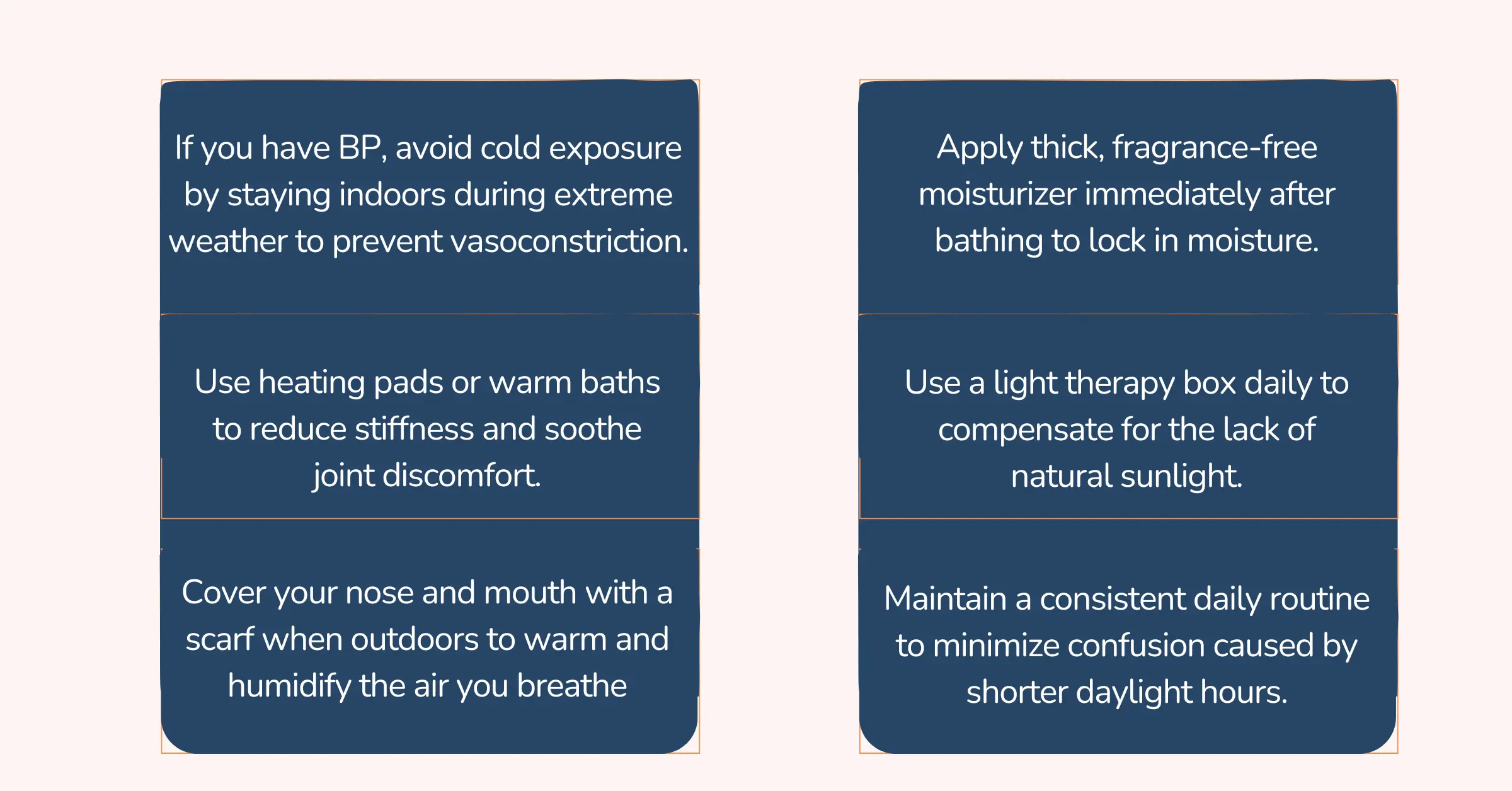So, grab a cup of coffee and settle in as I discuss how cold weather affects seniors’ health by highlighting seven conditions. This knowledge will come in handy not just this winter, but for many seasons to come. This article will also help you reduce risks, allowing you to enjoy the season with your loved ones.
Table of Contents
ToggleWhat Diseases Get Worse in the Winter?
These are diseases that can worsen due to cold weather, and if you already have them, you need to be careful.
1. High Blood Pressure & Cardiac Arrest:
Blood pressure in seniors is generally higher in winter than in summer. There are two reasons for that;
- Cold Weather narrows blood vessels, the process known as vasoconstriction
- Lack of physical activity which reduces blood circulation
When your arteries become restricted, it’s harder for blood to flow through them smoothly. This forces your heart to pump harder to keep blood moving, which can increase your blood pressure.
2. Joint Aches (Arthralgia)
Winter might not be the best time for you if you have joint aches or even worse arthritis. You may face limited mobility, pain, and discomfort. It is because the drop in temperature thickens the fluid that lubricates your joints.
Dr. Ishimori says;
A drop in barometric pressure can cause muscles and tendons to expand, which can put more stress on an already crowded joint
Moreover, it’s quite common for people your age to stay inactive during this weather, which further contributes to the pain.
Download our free caring for arthritis guide
3. COPD, Asthma & Bronchitis:
If you are diagnosed with asthma, bronchitis, or COPD, you have to be more careful while stepping outside. Frigid air can cause shortness of breath, wheezing, and worse coughing. It is because the cold air and low humidity during this season can irritate the airways and increase mucus production, making it harder to breathe.
Respiratory infections like influenza can also cause flare-ups in these conditions. For instance, bronchitis often develops after a cold or the flu.
4. Skin Issues:
Cold air is generally drier and it can irritate your skin. Eczema, particularly atopic dermatitis, is one of the most common skin conditions that worsens during winter. The cold, dry air and indoor heating strip moisture from the skin, leading to dryness, itching, and flare-ups.
Similarly, psoriasis can also feel worse in winter. This condition causes skin cells to build up quickly, leading to red, scaly patches that can be itchy and uncomfortable. In winter, the cold, dry air and lack of sunlight can make these patches even more inflamed and sore.
5. Winter Blues:
The condition Seasonal Affective Disorder (SAD) perfectly describes how you might feel during the winter, sad—low on energy, drained, and even depressed. This happens because of less exposure to sunlight and shorter daylight hours. These changes disrupt your body’s natural rhythm and reduce the production of a hormone called serotonin, which plays a key role in regulating mood, sleep, digestion, and wound healing.
6. Dementia:
Dementia patients are already prone to confusion, and shorter daylight hours in winter can make sundowning syndrome more common. This condition leads to a range of other issues, such as vision problems, sleep disturbances, and cognitive difficulties.
Download our free Caring for Alzheimer’s & Dementia guide!
What You Can Do?
Follow these tips to ease the harshness of winters.

Let Us Make This Winter Comfortable for You:
Winter is a part of life, and it doesn’t mean you have to put everything on hold. With a little support, you can make this season more comfortable and enjoyable. We’re here to help you do just that. If you’re struggling with health conditions that winter makes harder, you don’t have to face it alone.
Our caregivers are experienced in providing nursing care and are here to support you as health companions.
Let’s talk about how we can help. Reach out to us today!
The Takeaway:
Winter brings challenges and can often feel like a boring time of the year. If you suffer from chronic conditions, it can feel even more difficult. However, this article helps you identify triggers and understand the reasons behind symptom flare-ups, making it easier to manage your health during the colder months.
FAQ’s
1. What are the signs of hypothermia in elderly individuals?
Hypothermia occurs when body temperature drops below 35°C (95°F). In the elderly, signs include shivering, confusion, slurred speech, slow breathing, and drowsiness. It’s essential to seek immediate medical attention if these symptoms are present.
2. How much vitamin D should seniors take during winter?
Vitamin D is vital for bone health and immune function. In winter, reduced sunlight can lead to deficiencies. While many seniors benefit from 600–800 IU daily, it’s advisable to consult a healthcare provider for personalized recommendations.
3. Can exercise in cold weather improve immunity?
Moderate exercise boosts circulation and immune function. Even in cold weather, activities like walking can be beneficial. However, it’s crucial to dress appropriately and be mindful of weather conditions to prevent cold-related illnesses.
4. Does Your Immune System Weaken in Cold Weather?
Contrary to popular belief, cold weather itself does not directly weaken your immune system. However, the conditions associated with winter, such as spending more time indoors with limited ventilation and increased exposure to germs, can make it easier for illnesses like colds and flu to spread. Additionally, lower levels of sunlight in winter reduce vitamin D production, which can slightly dampen immune responses.

Fakiha is an experienced writer at ConsidraCare with an optimistic interest in life. She has a proactive approach to improving health and wellness for seniors. She offers well-researched and thoughtful information to help individuals make informed healthcare decisions for themselves and their loved ones.



